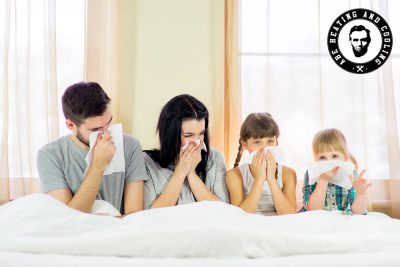“Abe's Heating and cooling were professional and on time. they helped me with two time sensitive projects and did excellent work. I know who I'll be calling if I should ever need an HVAC technician.”
Blog
 Allergies are often triggered by exposure to indoor pollutants. During the heating or cooling season, when doors and windows are shut tight, you’re often breathing stale air contaminated with dust, dirt, pet dander, pollen, mold spores, chemical traces, bacteria and other unpleasant irritants.
Allergies are often triggered by exposure to indoor pollutants. During the heating or cooling season, when doors and windows are shut tight, you’re often breathing stale air contaminated with dust, dirt, pet dander, pollen, mold spores, chemical traces, bacteria and other unpleasant irritants.
You may not realize it, but your HVAC equipment can be an ally in your fight against indoor air pollution. Here are eight ways you can improve your HVAC system’s capacity to reduce your exposure to airborne contaminants:
Pleated air filters with a MERV (minimum efficiency rating value) rating of between 8 and 13 are far better at trapping allergens than cheap fiberglass filters with low MERV ratings. They’re more expensive but won’t have to be changed as often (once every 3-4 months as opposed to every month).
The area around your air conditioner’s condenser unit should be kept clean and clear of anything that might obstruct air flow, up to three feet around its perimeter. Indoors, your furnace and evaporator coil indoors should also be cleaned regularly, and objects should not be set close to the furnace or left leaning against it.
The idea is to give your HVAC equipment room to “breathe,” so your furnace and air conditioner can move air in and out of the system at peak efficiency. Air that doesn’t move freely will become stagnant and carry higher levels of contamination.
Mold, mildew and bacteria are more likely to colonize your home if humidity levels are high. Therefore, if you live in a humid climate, or have ongoing moisture issues you’ve been unable to solve, it would be wise to invest in a dehumidifier. More powerful units can be merged with your HVAC system, while portable models can reduce humidity levels in specific rooms.
A relative humidity reading of between 30 and 50 percent is generally comfortable and low enough to discourage mold or bacteria growth.
Ductwork can develop cracks and crevices, possibly allowing for significant moisture penetration (moist ducts are breeding grounds for mold and bacteria). Contaminated air from the surrounding space can also be sucked in through these openings, contaminating your ducts even further.
HCAV technicians are trained to repair or replace leaky or aging ducts. It is important to perform these tasks, since your furnace and air conditioner will use these ducts to distribute heated or cooled air throughout your home.
Registers and return air vents will collect dust, that is inevitable. When you’re cleaning they’re easy to overlook, but if they’re dirty they can contribute to your indoor air contamination problems.
Registers and vents should be cleaned at the start of each heating and cooling season, and once every month or so after that.
Air purifiers attack the problem of indoor air contamination directly. They may be worth the extra investment if your loved ones are suffering from respiratory or skin allergies caused by indoor air pollution.
If you’re having problems with airborne contamination throughout your home, you can invest in a whole-house air purifier. These appliances integrate with your HVAC system and work in conjunction with your furnace and air conditioner. But if your problems with indoor pollution and allergies are confined to single rooms, a portable air purifier you can carry around would be the more cost-effective solution.
Mold likes moisture and can be found in basements, inside ductwork, on evaporator coils or in the condensation drain of your air conditioner, and sometimes on walls if moisture penetration is a problem.
Active HVAC systems will distribute mold spores far and wide, exacerbating your family’s allergies in the process. You should hire a professional to remove the mold in your home, and consult with a plumber or foundation repair specialist to find solutions to your moisture problems.
Before the start of each heating and cooling season, you should schedule an appointment with your HVAC contractor to have your HVAC equipment checked, tuned, cleaned, updated and repaired. Skilled HVAC technicians can keep your HVAC system in top working order, meaning it will filter the air more efficiently (among other things).
At ABE Heating and Cooling we can offer you numerous tips on how to improve your home’s indoor air quality and keep your family safe from allergens and other irritants. Our technicians are superbly trained in all maintenance procedures and can help you prevent small problems from becoming much worse. We are located in Brighton, Colorado and serve the entire Denver Metro Area, and if you’re worried about indoor air pollution or anything else HVAC-related, please call us today to discuss your concerns.